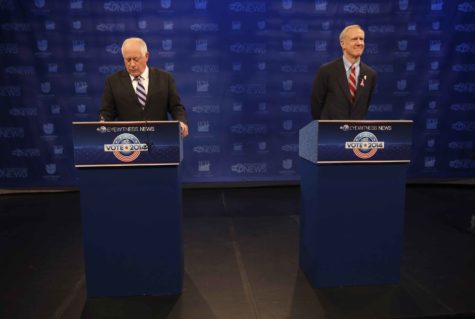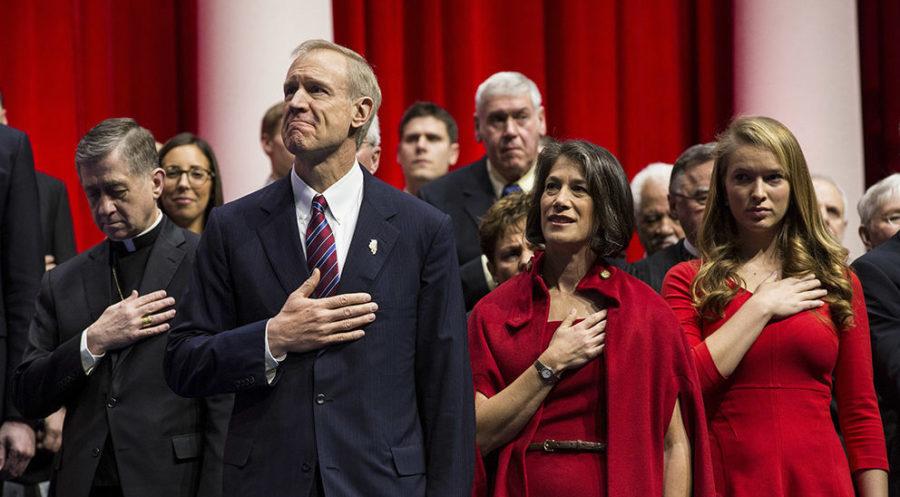Editorial: At last, criminal justice reforms in Illinois. Don’t blow it
Bruce Rauner is sworn into office at the Prairie Capital Convention Center on Jan. 12, 2015 in Springfield. (Zbigniew Bzdak/Chicago Tribune/TNS)
August 25, 2016
Last year: Gov. Bruce Rauner wants to reduce the state’s prison population by 25 percent within 10 years.
This year: Rauner “wants to let 25 percent of the state’s prisoners loose into our communities.”
Put another way: Last year, the governor’s pledge to overhaul the criminal justice system was met with rare bipartisan enthusiasm. This year, there’s an election.
Advertisement
So embattled Rep. John Bradley, D-Marion, attempts a tricky bank shot to attack his Republican challenger, Dave Severin: Severin’s campaign is getting a big financial assist from the House Republican Organization, by way of the state GOP, by way of Rauner, who wants to let the bad guys out of prison. Except that Rauner doesn’t want to let the bad guys out of prison.
Rauner’s goal is to keep people from going to prison in the first place, and to stop those who’ve done their time from going back. That’s a different approach.
For more than three decades, Illinois has relied heavily on early-release programs to moderate its prison population. In 2009, the door swung too far with then-Gov. Pat Quinn’s short-lived Meritorious Good Time Push program, which rewarded inmates for good behavior before they even got to prison.

In a little more than three months, 1,754 prisoners were released under MGT Push — some of them violent offenders who went right back to their old ways, nearly costing Quinn the 2010 election.
A postmortem report done by a retired appellate judge said the Department of Corrections put cost savings ahead of public safety. A year later, more than a quarter of those inmates were back in prison.
Illinois spends more than $1.3 billion a year on its prison system. About half of those who are released are back within three years.
Rauner’s Illinois State Commission on Criminal Justice and Sentencing Reform was tasked with breaking that cycle. Its members included lawmakers from both parties, law enforcement officials and advocates for crime victims. They looked at sentencing laws, diversion efforts and rehabilitation and re-entry programs.
Advertisement*
On Monday, Rauner signed more than a dozen criminal justice bills, many of them the product of that commission.
One requires a presentencing evaluation for first-time, low-level offenders to determine whether prison time is warranted. Another reduces probation time for juveniles and makes it easier for them to get treatment for substance abuse.
One loosens restrictions that prevent park districts from hiring people convicted of minor drug crimes or misdemeanor public indecency (you know: urinating on a tree). Another allows ex-offenders to obtain state licenses — to work as a barber or a roofer, for example — as long as their crime wasn’t related to that activity.
Others make it easier for juveniles and adults to expunge their records if a charge doesn’t stand up.
Still another creates a task force to study sex-offender registration laws, which place restrictions — sometimes for life — on people convicted of sex crimes. Being listed on the registry affects where they can live or work, for example, though not all are at risk to commit further crimes.
Those bills are mostly about second chances, about helping lawbreakers get their lives on track. That would leave plenty of cells for the people who belong in prison.
On Tuesday, Rauner signed a measure that cracks down on gun traffickers who take advantage of lax laws in neighboring states to obtain weapons to sell in Illinois. The new law carries a penalty of up to 20 years in prison — 30 for repeat offenders.
All of the new laws passed with bipartisan support. That’s tricky business these days, when Democrats and Republicans can’t agree on whether the sun is out.
But there’s a lot of unfinished business on the criminal justice agenda. So hear, hear for Rep. Kelly Cassidy, D-Chicago, who urged her fellow lawmakers — Rep. Bradley, are you listening? — not to poison the bipartisan effort during their campaigns.
“My party is running ads,” she said. “I’m sure that the Republicans will be running ads this year. And I dare everybody to stop.”
We double-dare them. Working together, Democrats and Republicans produced a batch of laws that will save taxpayers money, make communities safer and help offenders turn their lives around.
There’s some momentum going now. Don’t blow it.
___
(c) 2016 the Chicago Tribune
Visit the Chicago Tribune at www.chicagotribune.com
Distributed by Tribune Content Agency, LLC.
Advertisement








